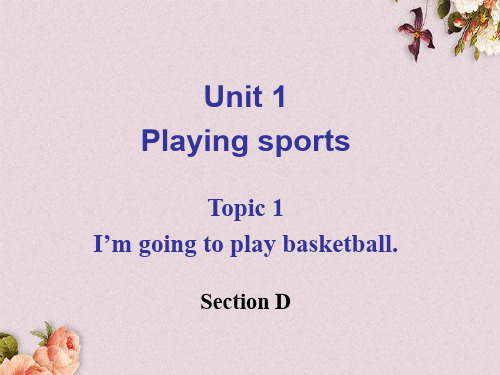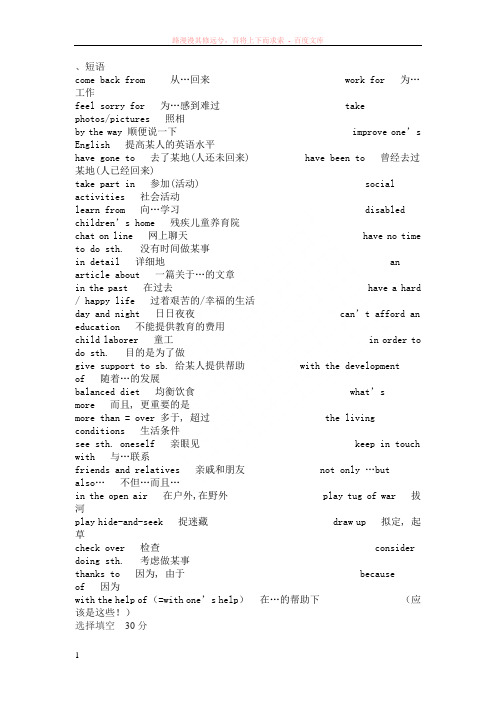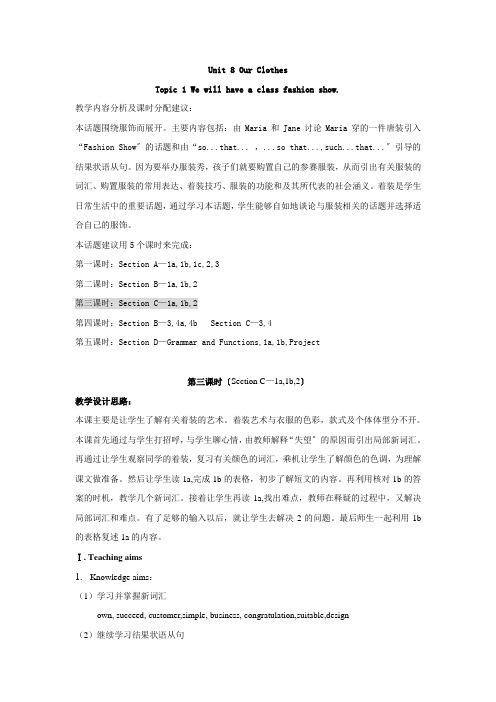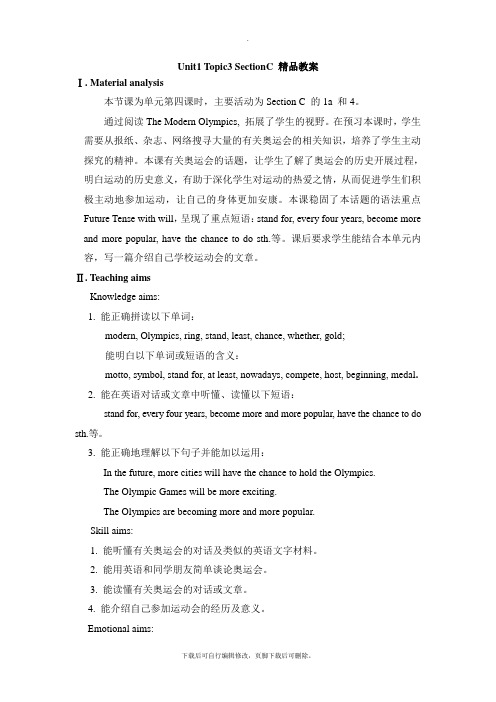仁爱英语U8T1SC
2020年仁爱版八年级英语上册Unit 1 Topic1 精品课件

pilot /paIlt/ musician /mjuzIn scientist /saIntIst
grow up
Let’s practice!
A: What are you going to be when you grow up?
B: I am going to be a doctor.
Let’s learn!
player /pleI(r)/ /dDkt(r)
fisherman /fImn postman /pustm policeman /pli:sm policewoman /pli:swm
New words:
teacher, player, farmer, doctor, policeman, policewoman, postman, fisherman, pilot, scientist, musician
Structures: —What are you going to be when
Let’s make a survey!
Dream job
basketball player teacher doctor pilot scientist …
Name
A: What are you going to be when you grow up?
B:I am going to be a…
A: What are you going to be when you grow up?
B: I am going to be a scientist.
Let’s join in the movie!
A: What am I going to be in the movie?
B: Oh, you are going to be a ...
【优课】仁爱初中英语八上《Unit 1Topic 1 I'm going to play basketball.》PPT课件D (1)

They are leaving for Beijing the day after
tomorrow.
3. 在明天的排球赛中,我们将和初三对垒。
We will play against Junior Three in the
volleyball match tomorrow.
national team tomorrow. It’s a pity that they are
going to __s_t_a_y___ for about two days. Then they _a_r_e_l_e_a_v_i_n_g__f_o_r_ Japan. So we’re going to watch the game against China tomorrow. Will you _j_o_in__ us?
points of this topic. 4. Write a passage about favorite
sport.
be going to + 动词原形
a. 主语的意图,即将做某事。 What are you going to do tomorrow? 你明天打算做什么?
b. 计划,安排要发生的事。 The play is going to be put on next month. 这部电视剧下个月将要公演。
the day after tomorrow 后天
e.g. What are you going to do the day after tomorrow?
Translate these sentences.
1. Tony 昨天到达了上海。
Tony arrived in/got to/reached Shanghai yesterday.
仁爱英语八年级上册unit1topic1重点语法

、短语come back from 从…回来 work for 为…工作feel sorry for 为…感到难过 takephotos/pictures 照相by the way 顺便说一下improve one’s English 提高某人的英语水平have gone to 去了某地(人还未回来) have been to 曾经去过某地(人已经回来)take part in 参加(活动) social activities 社会活动learn from 向…学习 disabled children’s home残疾儿童养育院chat on line 网上聊天 have no time to do sth. 没有时间做某事in detail 详细地 an article about 一篇关于…的文章in the past 在过去have a hard / happy life 过着艰苦的/幸福的生活day and night 日日夜夜can’t afford an education 不能提供教育的费用child laborer 童工 in order to do sth. 目的是为了做give support to sb. 给某人提供帮助 with the developmentof 随着…的发展balanced diet 均衡饮食what’smore 而且, 更重要的是more than = over 多于, 超过 the living conditions 生活条件see sth. oneself 亲眼见 keep in touch with 与…联系friends and relatives 亲戚和朋友not only …but also…不但…而且…in the open air 在户外,在野外 play tug of war 拔河play hide-and-seek 捉迷藏 draw up 拟定, 起草check over 检查 consider doing sth. 考虑做某事thanks to 因为, 由于 becauseof 因为with the help of (=with one’s help)在…的帮助下(应该是这些!)选择填空30分1. My parents and I have come back from our hometown.A. everB. neverC. just3 2. What’s __________ people in Australia?A. numberB. a number ofC. the population of3 3. Don’t touch anything __________ your teacher tells you to.A. ifB. thoughC. unless3 4. In India I saw many children for a cruel boss.A work B. working C. to w or k3 5. He was ________ the work.A. successful to finishB. successfully in finishingC. successful in finishing3 6. ----M ay I speak to M ab e1, please?--- -Sorry. She's Paris.A . gone to B. been in C .. been to3 7. ─By the way, where is Li Lei? ─ He __________ swimming.A. has beenB. has gone toC. has gone3 8. ---- to the United S tat es?--- -No, never, but I went to Canada a few years a go.A. Have you beenB. Have you goneC. Did y ou go3 9. ─You have made great progress in English. ─ __________.A. So I do.B. So have I.C. So I have4 0. I didn’t know what __________ to her last night.A. was happenedB. happeningC. happened4 1. Mr. Green has bought a MP3 as a present, but _______ his son _______ his daug hter likes it.A. not only; but alsoB. neither; norC. both; and42 . In the past, most children couldn ’ t go to school poor economy.A. becauseB. because ofC. since4 3. __________ it rains tomorrow, we’ll still go to the Great Wall.A. IfB. WhenC. Even though4 4. I didn’t know ______ because it was very noisy.A. what did you sayB. what you saidC. what you say4 5. ----Have you ever slept in the open air? ---- . I ’ m very timid(胆小的).A. Yes, I haveB. Yes, I doC. No, I haven ’ t4 6. In China, about ______ of people live in the country.A. three fifthB. third fifthC. three fifths4 7. Could you tell me the Chinese teenagers?A. anything aboutB. something aboutC. something for4 8. In the past, most children had no chance to go to school. , they had to work a nd make money to support their families.A. What ’ s moreB. Because ofC. So that4 9. ─ Why don’t you come and have lunch with me?─ Thanks, but I have ______ had my lunch. .A. everB. alreadyC. yet5 0. When I saw children working for a cruel boss, I felt sorry ______ them.A. toB. forC. withⅡ、口语应用分(A)情景反应从Ⅱ栏中选出Ⅰ中每句话的正确答案。
仁爱版新版八年级(上册)英语Unit1topic1SectionA课件

Me, too.常用于自己的做法或想法与别人的一致时。 e.g. —I like drinking milk in the morning.我喜欢早晨喝牛 奶。
—Me, too. 我也是。
also , as well
also, 也 I also like drinking milk in the morning
Join参加,加入
• join+ 团体 • join in通常指参加某种活动,尤其指和其他人一起参加某
项活动。 ①May I join in the game?我可以参加这个比赛吗? take part in指参加群众性活动、会议、劳动、游行等,往 往指参加者持有积极的态度,起一份作用,有时与join in 可互换。例句: • We should take part in school activities.我们应该积极参 加学校的活动。 = join in
He is going to write a letter tonight.
He will write a book one day.
see sb. do sth.看见某人做了某事;强调看见动作的全过 程,现在动作已结束。 see sb. doing sth. 看见某人正在做某事,强调动作正在进行。
—I’m going to play soccer. 我要去踢足球。
另外它还可以表示预测。 e.g. Look at the sky. It’s going to rainoing to与will两者都可表示将要发生的事、 将要去做某事,但它们有如下几点区别:
be going to表示近期、眼下就要发生的事情, will 表示的将来时间则较远一些,如:
• prefer 更喜欢+ 名词/动名词/不定式 • P 109 • I prefer apples. • I prefer playing basketball. • I prefer to play basketball.
仁爱初中英语八下精品教案设计U8T1(p3)

Unit 8 Our ClothesTopic 1 We will have a class fashion show.教学内容分析及课时分配建议:本话题围绕服饰而展开。
主要内容包括:由Maria和Jane讨论Maria穿的一件唐装引入“Fashion Show〞的话题和由“so...that... ,...so that...,such...that...〞引导的结果状语从句。
因为要举办服装秀,孩子们就要购置自己的参赛服装,从而引出有关服装的词汇、购置服装的常用表达、着装技巧、服装的功能和及其所代表的社会涵义。
着装是学生日常生活中的重要话题,通过学习本话题,学生能够自如地谈论与服装相关的话题并选择适合自己的服饰。
本话题建议用5个课时来完成:第一课时:Section A—1a,1b,1c,2,3第二课时:Section B—1a,1b,2第三课时:Section C—1a,1b,2第四课时:Section B—3,4a,4b Section C—3,4第五课时:Section D—Grammar and Functions,1a,1b,Project第三课时〔Section C—1a,1b,2〕教学设计思路:本课主要是让学生了解有关着装的艺术。
着装艺术与衣服的色彩,款式及个体体型分不开。
本课首先通过与学生打招呼,与学生聊心情,由教师解释“失望〞的原因而引出局部新词汇。
再通过让学生观察同学的着装,复习有关颜色的词汇,乘机让学生了解颜色的色调,为理解课文做准备。
然后让学生读1a,完成1b的表格,初步了解短文的内容。
再利用核对1b的答案的时机,教学几个新词汇。
接着让学生再读1a,找出难点,教师在释疑的过程中,又解决局部词汇和难点。
有了足够的输入以后,就让学生去解决2的问题。
最后师生一起利用1b 的表格复述1a的内容。
Ⅰ. Teaching aims1.Knowledge aims:(1)学习并掌握新词汇own, succeed, customer,simple, business, congratulation,suitable,design(2)继续学习结果状语从句2. Skill aims:〔1〕能够针对不同的人群提出恰当的着装建议。
仁爱版英语八年级上册 Unit1 Topic3 SectionC 精品教案

Unit1 Topic3 SectionC 精品教案Ⅰ. Material analysis本节课为单元第四课时,主要活动为Section C 的1a 和4。
通过阅读The Modern Olympics, 拓展了学生的视野。
在预习本课时,学生需要从报纸、杂志、网络搜寻大量的有关奥运会的相关知识,培养了学生主动探究的精神。
本课有关奥运会的话题,让学生了解了奥运会的历史开展过程,明白运动的历史意义,有助于深化学生对运动的热爱之情,从而促进学生们积极主动地参加运动,让自己的身体更加安康。
本课稳固了本话题的语法重点Future Tense with will,呈现了重点短语:stand for, every four years, become more and more popular, have the chance to do sth.等。
课后要求学生能结合本单元内容,写一篇介绍自己学校运动会的文章。
Ⅱ. Teaching aimsKnowledge aims:1. 能正确拼读以下单词:modern, Olympics, ring, stand, least, chance, whether, gold;能明白以下单词或短语的含义:motto, symbol, stand for, at least, nowadays, compete, host, beginning, medal.2. 能在英语对话或文章中听懂、读懂以下短语:stand for, every four years, become more and more popular, have the chance to do sth.等。
3. 能正确地理解以下句子并能加以运用:In the future, more cities will have the chance to hold the Olympics.The Olympic Games will be more exciting.The Olympics are becoming more and more popular.Skill aims:1. 能听懂有关奥运会的对话及类似的英语文字材料。
仁爱版八年级上册英语 Unit 1 Topic 1 知识点总结
八年级上册仁爱版第一单元T1知识点总结Topic 1一、重点词汇:during [djʊərɪŋ] 在…期间against [əˈgenst]对着,反对team [ti:m]队,组win [win] 获胜,赢得cheer [tʃiə]加油,欢呼;喝彩;football [futbɔ:l] 足球practice ['præktɪs] v.&n.练习,实践prefer [prɪ'fɜ:(r)]更喜欢,宁愿(选择) row [rəʊ]划船;n.(一)排,(一)行quite [kwaɪt]相当,很,十分join [dʒɔɪn]加入,参加;连接;会合skate [skeɪt]溜冰,滑冰cycle ['saɪkl]骑自行车tennis ['tenɪs]n.网球player ['pleɪə(r)]n.比赛者,选手rocket ['rɔkit]火箭dream [dri:m]n.梦,梦想;v.做梦grow [ɡrəʊ]成长,生长;发育;种植;变成scientist [ˈsaɪəntɪst] n.科学家future [ˈfju:tʃə(r)]n.将来musician [英][mjuˈzɪʃn]n.音乐家,乐师pilot ['pailət] 飞行员,驾驶员policeman ['pəli:smən] 男警察postman ['pəustmən] 邮递员fisherman ['fiʃəmən] 捕鱼的人jump [dʒʌmp]v.跳跃;n.跳跃;猛扑spend [spend] 度过;花费(金钱、时间等) exercise ['eksəsaɪz] 锻炼,做操;练习baseball ['beɪsbɔ:l]n.棒球weekend [ˌwi:k'end]n.周末part [pa:t] n.一部分health [helθ] n.健康,卫生popular [ˈpɒpjələ(r)]流行的,大众的,受欢迎的world [ˌwə:ld]n.世界,全球heart[hɑ:t] 心脏,心;纸牌中的红桃lung [lʌŋ]肺;肺脏healthy [ˈhelθi] adj.健康的,健壮的fit [fɪt]健康的;适合的;v.(使)适合;安装relax [rɪ'læks](使)放松,轻松supper [sʌpə]晚餐famous ['feɪməs] adj.著名的teammate [ˈti:mmeɪt] n.队友excited [ɪkˈsaɪtɪd] 激动的,兴奋的bad [bæd] 坏的,不好的leave [li:v]离开;剩下;n.假期,休假pity [piti]遗憾,可惜二、重点短语be going to do打算做...play basketball 打篮球like doing 喜欢做...see sb do 看见某人做...during the summer holiday在暑假期间would you like to do你想要做... cheer sb on为某人加油I’d love to 我很乐意have to 不得不practice doing练习做... both...and 两者都of course当然play for 为...效力grow up长大go cycling骑自行车twice a week一周两次go mountain climbing去爬山spend...(in)doing花时间去做... in the gym在体育馆every day每天be good at 擅长于...school sports meet 学校运动会take part in参加the high jump跳高the long jump跳远be sure that确信the day after tomorrow后天all over the world全世界a good way to do 一个做...的好方法keep healthy/ fit保持健康arrive in 到达leave for离开...去往It’s a pity that真遗憾...join sb加入某人go skating去滑冰climb a mountain爬山row a boat划船play table tennis打乒乓球三、课文重要知识点Section A1.I’m going to play basketball.考点1):play+球类运动play football/soccer/basketball/table tennis...考点2):将来时态①will+do②be going to do 表示按计划、安排将要发生某事,有人称变化There be句型的将来时:There will be...There is/ are going to be...2.I often saw you play basketball during the summer holiday.考点1):see--sawsee sb do看见某人做...表示经常性、习惯性动作,常于时间状语often、every day等连用see sb doing 看见某人正在做...强调动作正在进行I see. 我明白了。
仁爱版英语八年级上册:Unit 1 Topic 3 The school sports meet
Topic 3 The school sports meet is comingSection A【教学重难点】The main activities are 1a and 2a.本课重点活动是1a和2a。
【教学目标】1.Learn some new words and phrases: foreign, have fun, lots of, be ready for, relay race, maybe, make friends, perhaps2.Learn the future tense with will:(1)I think I’ll have lots of fun. (2)I’ll do my best. I won’t lose.(3)Maybe I’ll make many friends during the sports meet. (4)I’ll join in the teachers’ relay race.3.Talk about school sports meet:(1)I will take part in the school sports meet. (2)Which sport will you take part in?(3)I’ll be in the long jump and the high jump. (4)I’m sure our school sports meet will be exciting.【教学准备】录音机/幻灯片【教学过程】Step 1 Review 第一步复习(时间:8分钟)复习上个话题的语法、句型及功能用语,引出本课生词、语法及话题,导入新课。
(让学生进行链式问答,复习上一话题的重要语法和功能用语。
)Step 2 Presentation 第二步呈现(时间:8分钟)呈现1a对话的情境,找出关键词,为下一步打下基础。
1.(听1a录音,呈现1a内容。
仁爱版八下教学设计U8T1(p4) We will have a class fashionshow
Unit 8 Our ClothesTopic 1 We will have a class fashion show.教学内容分析及课时分配建议:本话题围绕服饰而展开。
主要内容包括:由Maria和Jane讨论Maria穿的一件唐装引入“Fashion Show”的话题和由“so...that... ,...so that...,such...that...”引导的结果状语从句。
因为要举办服装秀,孩子们就要购买自己的参赛服装,从而引出有关服装的词汇、购买服装的常用表达、着装技巧、服装的功能和及其所代表的社会涵义。
着装是学生日常生活中的重要话题,通过学习本话题,学生能够自如地谈论与服装相关的话题并选择适合自己的服饰。
本话题建议用5个课时来完成:第一课时:Section A—1a,1b,1c,2,3第二课时:Section B—1a,1b,2第三课时:Section C—1a,1b,2第四课时:Section B—3,4a,4b Section C—3,4第五课时:Section D—Grammar and Functions,1a,1b,Project第四课时(Section B—3,4a,4b Section C -3,4)教学设计思路:本课的主要任务是培养学生的写作能力。
根据朋友们的形体和着装习惯来进行有针对性的建议。
本课时的内容相对比较零散,既有听力训练,又有语音知识,还有看图说话和写作任务。
写作是重点。
首先通过看图评判图中人物着装是否适宜,来简要复习Section C - 1a 的着装知识。
然后听录音完成Section B -3的听力任务。
紧接着完成Section B-4a 和4b的语音训练。
随后让学生看图说话,复习巩固so...that ... 和such... that... 的用法完成Section C- 3.最后让学生调查自己的朋友的着装习惯,并以短文的形式给出相应的建议,教师鼓励学生读出他们的短文,完成本课时。
仁爱版英语七年级下册G8U8T1SD-课件
pink clothes, maybe he or s正he如i俗s l语ive所ly讲an:d“ea衣sy如-go其in人g.”W。e get ideas about people from their clothes. As the saying goes, “You are what you wear.”
Unit 8 Our Clothes
Topic 1 We will have a class fashion show.
Section D
Enjoy the video
Learning Objectives
What will we doFra bibliotektoday?1. Learn and be able to use the following words and phrases accurately: discuss, meaning, be made of/from, so... that, such... that.., so that
Key points
1. The first types of clothes were made of animal skins. be made of... 由......制成(从表面可看出原材料) be made from... 由......制成(从表面看不出原材料) E.g:这张桌子是由木头制成的。The desk is made of wood. 纸是由木材制成的。Paper is made from wood.
Grammar Focus
- 1、下载文档前请自行甄别文档内容的完整性,平台不提供额外的编辑、内容补充、找答案等附加服务。
- 2、"仅部分预览"的文档,不可在线预览部分如存在完整性等问题,可反馈申请退款(可完整预览的文档不适用该条件!)。
- 3、如文档侵犯您的权益,请联系客服反馈,我们会尽快为您处理(人工客服工作时间:9:00-18:30)。
Read 1a and find out the suggestions for dressing. Dear Judy, Congratulations! You opened your own clothing store.I hope you will succeed.It's important for you to help people choose suitable clothing. I have a few suggestions for success. Fat customers should wear dark color clothes and simple styles. These clothes will make them look smaller.They should not wear bright or light colors. Short people should wear soft colors,and their clothes should not have big contrasts. Fancy designs or flowers do not look good on short people. If tall and thin people wear warm colors,they will appear strong and full.Customers with broad waists will look good in dark or coldcolored clothes that will make them look slimmer. Helping people choose clothes is important. I know you will be very good at this work,and I hope your business does well. Your friend, Tom
• 3. 比较而言:clothes 的含义比较具体,而 clothing 的含义 则比较抽象。从语体上看,clothing 比 clothes 更正式。比 较: • I changed my clothes. 我换了衣服。 • He is washing his clothes. 他在洗衣服。 • Our clothing protects us against the cold. 我们的衣服可以 御寒。 • We are well provided with food and clothing. 我们吃得好 ,穿得好。 • 若不考虑其细微区别,两者常可换用(注:一个是复数, 一个不可数)。如: • He spent a lot of money on clothes [clothing]. 他花了许多 钱买衣服
Unit 8 Our Clothes
Section
C
The dark color clothes and simple style make him look smaller.
style
n.样式,款式;方式,作风
Their clothes have big contrasts,these clothes make them shorter.
congratulations n. 祝贺,恭喜,多用thank you来回答 1.congratulations to sb. 祝贺某人 2.congratulations sb. on sth. 向某人恭喜,祝贺 eg:congratulations on your success! congratulations on your baby! congratulations on your marriage. congratulations on your new job congratulations on winning the soccer game!
n.设计;设计方案;构思v.设计,构思;计划
The dark or cold-colored clothes make them look slimmer.
adj.冷色调的
slim
adj.苗条的,纤细的 has broad waist. Her clothes make her full. The girl in dark and cold-colored clothes looks slimmer.
• 二、clothes 和 clothing 均可表示“衣服”,用作“衣服” 的统称,但在用法上有差别: • 1.clothes 是一个没有单数形式的复数名词, 其前不可加不 定冠词,也不可加数词,但可用 some, these, those, many, few 等词修饰。如: • 正:those clothes / few clothes / many clothes • 误:a clothes / two clothes / three clothes • 2. clothing 是不可数名词。 They wear very little clothing. 他们衣服穿得很少。
appear [ə'piə] vi. 出现,呈现: A woman suddenly appeared in the doorway. 一个女人蓦地出现在门口。
显露,显现: Freckles appear on her face every summer. 她脸上每年夏天都显露(日晒的)斑点。 觉得,觉察;看来(好像),显得明白,变得明显: It appears (to me that) she's right. (依我)看来她是对的。
• 这三个词长的区别是: • cloth: 也就是“布料“的意思(而不是衣服,而且不可 数名词) • clothes: 指具体的,看的见摸的着的衣服, I buy some clothes this afternoon clothing: 指笼统的服装,概念的上衣服, • One must wear protective clothing to enter the lab (必须穿防护服) • cloth比较好区分,就是布料衣料 • clothes 和 clothing的话,好好体味这几个例句 -总的原则是,具体的一些衣服用clothes, 表服装这 个种类或很泛的“穿的”这个概念用 clothing
We congratulated him on his success/his having succeeded.我 们祝贺他的成功。 I congratulated myself on having escaped unhurt.我因自己幸 免于难而感到幸运
• 2.It's important for you to help people choose suitable clothing. 帮助顾客挑选得体的服装对你来说是很重要的。 此句为形式主语it引导的固定句型:
broad waist
adj.宽阔的,广阔的;广泛的 n.腰,腰部
They are tall and thin. They wear warm colors. They appear strong and full.
• 首先应区分开 cloth 与 clothes / clothing:cloth表示“布” 、“衣料”,是不可数名词。 She bought some cloth to make herself a dress. 她买了些布要 给自己做一件连衣裙。 • 表示用作某种特殊用途的布(如:桌布,台布,揩布等), 是可数名词。 Clean the windows with a soft cloth. 用块软布擦窗子。
• congratulate v. 向....表示祝贺 ①congratulate 是动词,作“祝贺、庆祝”解时,必须以被祝 贺的人作宾语, congratulate sb. on sth./doing sth. 表示“祝贺某人……”。 congratulate oneself表示“庆幸,感到幸运”。
1).simple, easy 这两个形容词均含“简单的,轻易的”之意。 The answer is really quite simple 2).简朴的;朴素的;不加装饰的 He ate a simple dinner of rice and beans. 他晚饭简单地吃了点米饭和豆子。 ...the simple pleasures of childhood... 童年简单的快乐
It is +adj. (for sb.) to do sth.
意为“做 某事对于某人来说是......的” • E.g:学好英语对我们来说是很重要的。 It's very important for us to study Enlgish well.
• choose • [英][tʃu:z][美][tʃuz] • vt.挑选; 认为…比其它更可取; 决定或 选定; • vi.选择; 进行挑选; • 第三人称单数:chooses过去分词: chosen现在进行时:choosing过去式: chose
• foolish, silly, stupid, simple, dull • 这些形容词都可表示“愚蠢的,笨的,傻的”之 意。 • foolish: 一般指人的无头脑、愚蠢,或缺乏常识 与判断力,或指行动的愚蠢可笑。 • silly: 口语用词,可和foolish互换,但语气稍强 。侧重指人的言行不合常规或不理智,强调单纯 、低能和糊涂。 • stupid: 多指人或行为的愚蠢,尤指先天智能低 下,或因某种原因失去正常的反应或感觉。有时 也可与silly和foolish换用,但语气强,常含贬义。 • simple: 强调头脑简单或缺少智慧。 • dull: 指对问题理解迟钝,缺乏灵敏机智头脑, 可能是先下智力低下,也可能因疲倦或健康不佳 所致。
• design [di'zain] vt. • 设计;构思;草拟,画草图 They designed us a beautiful building. 他们为我们设计了一幢漂亮的大楼。 • 决意(做);打算(做),计划(做),想要,立意要,意欲: She designed to be a doctor. 她立志当一名医生。 Her mother designed her for a lawyer. 她母亲打算要她当律师。
